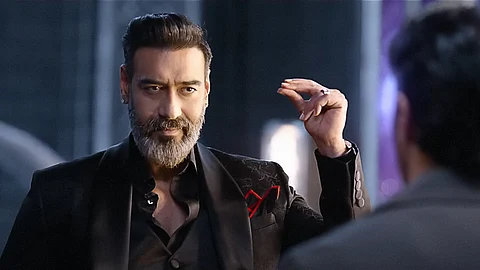
- Reviews
- Power List 2024
- Cannes 2024
- In-Depth Stories
- Web Stories
- News
- FC Lists
- Interviews
- Features
- FC SpecialsFC Specials

Director: Indra Kumar
Writers: Aakash Kaushik, Madhur Sharma
Cast: Sidharth Malhotra, Ajay Devgn, Rakul Preet Singh, Nora Fatehi
With old-school directors like Indra Kumar, it’s hard to tell whether a movie is a nostalgic ode to Nineties’ mediocrity or a mediocre ode to Nineties nostalgia. Thank God is neither and both. It is not an ode, but an unwitting reincarnation of a scrapped aesthetic – the school-level moral posturing, a background score that sounds like emotions went to piano class, staging so synthetic that it would insult the intelligence of a newborn, characters that look like rejected roleplay models, and ‘comic’ acting that belongs to a museum of cautionary tales. Its audacity to be made in 2022 is almost impressive. This is the sort of rare rubbish that gaslights adult viewers into thinking it’s a silly children’s film (why else is Sidharth Malhotra making those faces?) and children into assuming it’s a goofy adult entertainer (why else is Nora Fatehi seducing the air?).
Thank God is a social dramedy so backward that it makes Jim Carrey crass-ics like Liar Liar (1997) and Bruce Almighty (2003) look like titles way ahead of their time. The premise is not dissimilar. A greedily handsome and handsomely greedy jerk named Ayaan Kapoor (the perennially miscast Malhotra) has an accident, and is offered a chance to redeem himself in the afterlife. While his lifeless body is in surgery, Hindu deity Chitragupta (Ajay Devgn on autopilot) – who calls himself CG – engages the in-transit Ayaan in an entirely unoriginal game show. Ayaan is tested by being inserted in both fictional and real situations. If he fails a test, the audience (composed of animated figures that put the cylindrical fielders in Codemasters’ Brian Lara Cricket 1999 to shame) hurls black balls into a tube. If he passes, white balls. If his misdeeds eventually outweigh his deeds, Ayaan will live. If not, he will be sent to hell, a place whose production value can’t be any worse than what we’re already watching on screen.
The stages are random, even by the standards of a movie that looks like a boomer in denial of its age. Ayaan loses the first stage for fat-shaming an arrogant twit in the elevator, and CG promptly sermonises that Ayaan is the sort of guy who will always notice a tiny black dot on a vast white board – which could also be construed as an attack on eagle-eyed film critics. In another stage, Ayaan – a real estate hotshot now buried in debt and emotional debris – is thrust into a scenario where he becomes the Singham-like cop he once dreamt of, only to botch up a hostage situation. (The pre-internet-skit-age slapstick humour is so dated that I could nearly see its cufflinks). Then we are shown how his wife (the omnipresent Rakul Preet Singh), who’s an actual cop, handled the situation long ago: By over-empathising with the robber, reducing him to tears and having all the hostages donate bundles of cash to him on their way out. Sometimes, I marvel at these descriptions even as I type them.
In an ‘advanced’ stage, Ayaan’s faithfulness is put to test when he is seduced by a dancing Nora Fatehi, a celebrity he’s always lusted for. Which is to say even the chauvinism is so Nineties that it shares a universe with the pretend-rape scene of Indra Kumar’s Ishq (1997). The final act – with corny twists that play out like a nursery rhyme gone wrong – just refuses to end. Evidence of this lies in how the ushers in our theatre opened the exit doors way before the end credits rolled. Then they closed it. Then they gave up and left themselves.
Thank God made me cringe, not only because the film itself is so dull and juvenile, but also because it brought back memories of how my pre-teen head used to process such low-IQ comedies. One of the perils of evolving is the utter embarrassment we feel for the person we leave behind. This disowning of our previous selves often involves a chaste distancing from the movies we once enjoyed. Thank God is the reverse-embodiment of this feeling – its cheapness is right here, right now, in the moment, and a welcome reminder of how sensible I was a few hours ago. I feel just as sensible while finishing this review. My opinion about this film will never change. Does that imply I’ll never grow old? Is Thank God that rare drug of agelessness? Is this my afterlife? Questions, questions.